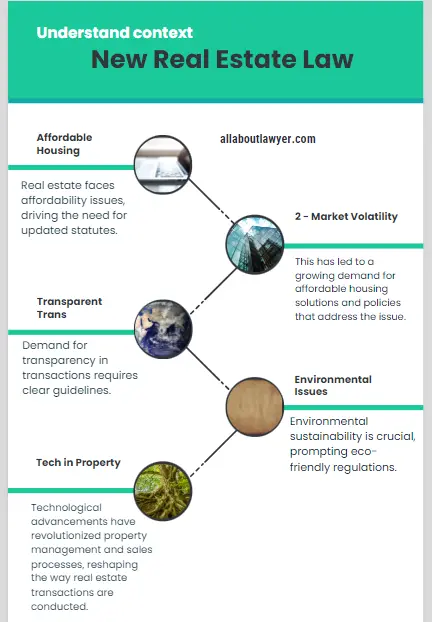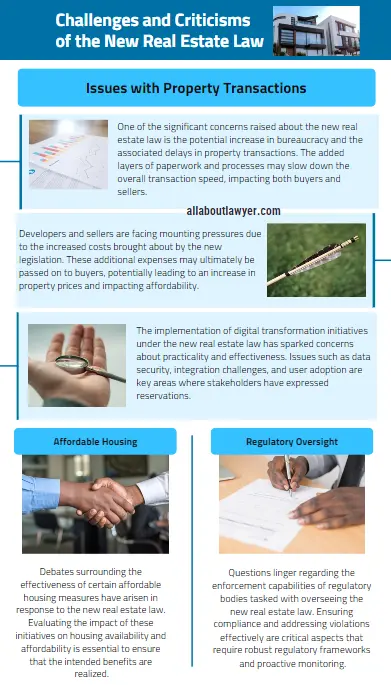What Does the New Real Estate Law Mean?
The real estate industry is constantly evolving, and with it comes a slew of new regulations and guidelines designed to protect both buyers and sellers. The recent property legislation update has sparked considerable interest and debate among industry professionals and homeowners alike. In this comprehensive guide, we’ll delve into the intricacies of what does the new real estate law mean, exploring its implications and how it might affect various stakeholders in the property market.
Table of Contents
Understanding the Context of the New Real Estate Law

Before we dive into the specifics of the new property guidelines, it’s essential to understand the context in which these changes have been implemented. The real estate industry has faced numerous challenges in recent years, including:
1. Housing affordability concerns
2. Market volatility
3. Increased demand for transparency in transactions
4. Environmental sustainability issues
5. Technological advancements in property management and sales
These factors have collectively contributed to the need for updated realty statutes that address modern challenges while protecting the interests of all parties involved in real estate transactions.
Read also: What Is The New Real Estate Commission Law In The US?
Key Components of the New Real Estate Law
The fresh property law provisions encompass a wide range of areas within the real estate sector. Let’s examine some of the most significant aspects of this legislation:
1. Enhanced Transparency in Property Transactions
One of the primary goals of the new housing regulations is to increase transparency in real estate dealings. This includes:
– Mandatory disclosure of property history, including previous owners and any major renovations or repairs
– Clearer guidelines on property valuations and appraisals
– Stricter regulations on real estate advertising to prevent misleading information
These measures aim to provide buyers with more accurate and comprehensive information about properties they’re interested in, reducing the risk of unpleasant surprises after purchase.
2. Improved Consumer Protection
The modern real estate regulations place a strong emphasis on protecting consumers‘ interests. Key provisions include:
– Extended cooling-off periods for property purchases, allowing buyers more time to reconsider their decision
– Stricter penalties for real estate agents and sellers who engage in deceptive practices
– Enhanced dispute resolution mechanisms for addressing conflicts between buyers and sellers
These consumer protection measures are designed to foster greater trust in the real estate market and provide recourse for individuals who may have been unfairly treated in property transactions.
3. Sustainable Development Initiatives
Recognizing the growing importance of environmental concerns, the new property law incorporates several sustainability-focused provisions:
– Incentives for developers who incorporate green building practices
– Stricter energy efficiency requirements for new constructions
– Grants and tax breaks for homeowners who implement eco-friendly upgrades
These initiatives aim to promote more sustainable development practices in the real estate industry, aligning property legislation with broader environmental goals.
Related Articles For You:
Kentucky-property-right-of-way-laws
4. Digital Transformation in Real Estate Processes
The contemporary realty legislation also addresses the increasing role of technology in property transactions:
– Legal recognition of digital signatures and online property transactions
– Guidelines for the use of virtual property tours and remote inspections
– Regulations surrounding the use of blockchain technology in property record-keeping
These provisions aim to streamline real estate processes while ensuring that digital innovations are implemented securely and ethically.
5. Affordable Housing Measures
Addressing the ongoing concern of housing affordability, the new real estate legal reforms include several measures designed to increase access to affordable housing:
– Zoning changes to encourage the development of mixed-income housing
– Incentives for developers to include affordable units in new projects
– Expanded rent control provisions in certain areas
These initiatives aim to create more diverse and accessible housing options across different market segments.
Implications for Various Stakeholders In New Real Estate Law
The updated housing regulations have far-reaching implications for various stakeholders in the real estate industry. Let’s explore how different groups might be affected:
For Homebuyers:
– Greater access to information about properties
– Enhanced protection against fraudulent practices
– Potentially longer processing times for property purchases due to increased due diligence requirements
For Sellers:
– More stringent disclosure requirements
– Potential for increased liability if all relevant information is not provided
– Possible delays in sale processes due to extended cooling-off periods
For Real Estate Agents:
– Need for additional training to comply with new regulations
– Increased responsibility in ensuring transparent and accurate property information
– Potential for higher professional standards and improved industry reputation
For Developers:
– New opportunities for sustainable development projects
– Challenges in meeting stricter energy efficiency and affordability requirements
– Potential for increased costs due to compliance with new regulations
For Lenders:
– Adjustments to lending practices to align with new property valuation guidelines
– Potential for increased scrutiny of loan applications due to enhanced transparency requirements
– Opportunities to develop new financial products aligned with sustainability initiatives

Challenges and Criticisms of the New Real Estate Law
While the new property legislation aims to address many longstanding issues in the real estate industry, it has not been without its critics. Some of the challenges and criticisms include:
1. Increased bureaucracy and potential for delays in property transactions
2. Higher costs for developers and sellers, which may be passed on to buyers
3. Concerns about the practical implementation of some digital transformation initiatives
4. Debates over the effectiveness of certain affordable housing measures
5. Questions about the enforcement capabilities of regulatory bodies
These concerns highlight the complex nature of real estate regulation and the need for ongoing dialogue and adjustment as the industry adapts to new legal requirements.
The Future of Real Estate Under the New Law
As the industry begins to adapt to the modern property legislation, we can expect to see several trends emerge:
1. Increased adoption of technology in property transactions and management
2. Greater emphasis on sustainable and energy-efficient properties
3. More diverse housing options across different price points
4. Enhanced professionalism and transparency in real estate practices
5. Potential for market consolidation as smaller players struggle to meet new compliance requirements
The real estate legal landscape will likely continue to evolve as regulators and industry stakeholders work to refine and improve the new guidelines.
Conclusion
The new real estate law represents a significant shift in the property market legal changes, aiming to address long standing issues while preparing the industry for future challenges. By enhancing transparency, improving consumer protection, promoting sustainability, and embracing digital transformation, these updated realty statutes seek to create a more equitable and efficient real estate market.
As with any major legislative change, there will be a period of adjustment as various stakeholders adapt to the new requirements. However, in the long term, these real estate policy updates have the potential to foster a more trustworthy, sustainable, and accessible property market for all.
Whether you’re a homebuyer, seller, real estate professional, or developer, staying informed about these property law amendments is crucial for navigating the evolving landscape of real estate transactions and investments.
FAQs
Q: When do the new real estate laws take effect?
A: The implementation timeline can vary depending on the specific provisions of the law and your location. Generally, major legislative changes are phased in over a period of months or even years to allow for industry adjustment. Check with your local real estate regulatory body for specific dates.
Q: How will the new law affect property prices?
A: The impact on property prices can be complex. While some measures may increase costs for developers and sellers, others aim to improve affordability. The overall effect will likely vary by location and property type.
Q: Do I need to do anything differently if I’m planning to buy or sell a property under the new law?
A: Yes, you may need to comply with new disclosure requirements, extended cooling-off periods, or other provisions. It’s advisable to consult with a real estate professional or lawyer familiar with the new regulations in your area.
Q: How will the new sustainability requirements affect existing properties?
A: While many sustainability measures focus on new constructions, there may be incentives or requirements for upgrading existing properties. Check local regulations for specific details on how existing properties might be affected.
Q: Will the new law make it easier or harder to get a mortgage?
A: The law’s impact on mortgages may vary. Enhanced transparency requirements could lead to more thorough vetting processes, but this could also result in more stable lending practices. Consult with mortgage professionals for personalized advice.
About the Author

Sarah Klein, JD, is an experienced estate planning attorney who has helped clients with wills, trusts, powers of attorney, and probate matters. At All About Lawyer, she simplifies complex estate laws so families can protect their assets, plan ahead, and avoid legal headaches during life’s most sensitive moments.
Read more about Sarah
